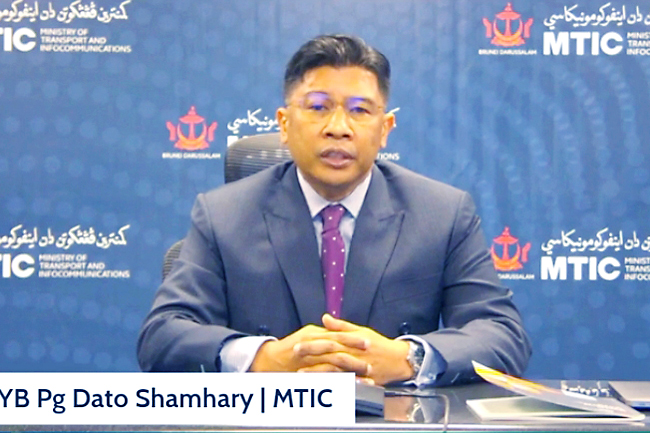James Kon
Since the launch of the Digital Economy Masterplan in June 2020, Brunei Darussalam’s digital transformation journey has seen growth from time to time where several initiatives and programmes have been introduced, including structuring of a digital data policy and governance framework to regulate the workings of digitalisation, such as Personal Data Protection Order and a Cyber Security Order.
This was said by Minister of Transport and Infocommunications Perngiran Dato Seri Setia Shamhary bin Pengiran Dato Paduka Haji Mustapha in his keynote address at the virtual Digital Economy Forum 2022 yesterday.
Other initiatives outlined by the minister included: the development of network infrastructures, the setup of a Commercial Data Centre aiming to provide innovative services for greater productivity, and the newly launched Brunei Innovation Lab (BIL) to spur growth of tech businesses and their solutions through development programmes, funding, market access and community building.
Pengiran Dato Seri Setia Shamhary also shared that over the past few years, businesses and industries slowly adopted the Industrial Revolution 4.0, such as in automation and data exchange in technology and processes including the use of artificial intelligence (AI), cognitive computing, cloud computing and the Internet of Things (IoT), among others.
“The fast pace in the advancement of technologies requires us to be adaptive and we need to be ready as well, as prepare ourselves for the future, he added.
He recalled the establishment of the Digital Economy Council on July 15, 2019 consented by His Majesty Sultan Haji Hassanal Bolkiah Mu’izzaddin Waddaulah ibni Al-Marhum Sultan Haji Omar ‘Ali Saifuddien Sa’adul Khairi Waddien, Sultan and Yang Di-Pertuan of Brunei Darussalam, and subsequently, the release of the Digital Economy Masterplan 2025.
The Council, he said, “is co-chaired by myself and Minister at the Prime Minister’s Office and Minister of Finance and Economy II Dato Seri Setia Dr Awang Haji Mohd Amin Liew bin Abdullah, and the members comprise industry and education authorities as well as businesses and industry representatives which demonstrated the integrated, coordinated and holistic approach required to achieve our vision of a ‘Smart Nation through Digital Transformation.”


Speaking about the digital economy, he stressed, “It cannot be denied that the backbone is connectivity. In a digital economy there will be growing connectedness of people, organisations, and machines resulting from the Internet, mobile technology and the IoT. As such, the conventional notion about how businesses are structured; how companies interact; and how consumers obtain services, information and goods are being reshaped.”
He continued, “This is where our local business should capitalise on. The changes happening should provide local businesses with more opportunities than before and break down the barriers that may have limited local businesses access to markets and services both internally and externally.”
Looking ahead, he highlighted, “The four strategic thrusts of the Digital Economy Masterplan cover, Industry and Business Digitisation that also encourages innovation and R&D; Government Digitisation that includes providing an enabling environment; Thriving Digital Industry that offers the capabilities and technologies, and Manpower and Talent Development to ensure our workforce is digital ready now and for the future.”
As the key enabler for a Smart Nation, the minister explained, “The scope of Digital Economy goes beyond the ICT sector. Digital Economy covers initiatives and activities, both in the digital and non-digital sectors, that leverages on technology to achieve impactful outcomes, such as increased productivity and production, enhanced efficiency, increased cost effectiveness, improved transparency and governance, encourages participation and facilitates official, business and personal transactions.”
Under the Digital Economy Council, three key flagship projects have been identified as a backbone of the digital economy eco-system in the country. They are Digital Identity, Digital Payment and National Information Hub (NIH) aiming to drive and enable the adoption of digital technologies.
“We hope to create innovations by utilising key emerging technologies, creating new business models and opportunities, increase workforce by creating new jobs and skillsets and produce marketables in line with current and emerging economic needs and with the potential to be exported.
“A key trend is the development of technology-enabled platforms that combine both demand and supply to minimise disruption to existing industry structures.”
Overall, he said, “The inexorable shift from simple digitisation to innovation, based on combinations of technologies is forcing companies to reexamine the way they do business.
Hence, it is imperative that the government, industry and society are closely interrelated in adopting the Digital Economy eco-system. This can succeed with a Whole of Nation approach having total engagement, participation and commitment from all players, from the government, industry and the society.
“Only through the implementation and delivery of Brunei Darussalam’s digital transformation can the vision of the Digital Economy be fully realised for economic progress, sustainability and social well-being,” he said.
The forum was part of the Brunei Economy programme, an initiative by the ASEAN and APEC Business Advisory Councils of Brunei in collaboration with the Ministry of Finance and Economy and in partnership with Baiduri Bank to connect global issues with the Brunei economy. Darussalam Enterprise, UBD, CSPS, Royal Brunei, Radio Television Brunei with Borneo Bulletin and Media Permata are also partners in the programme.






